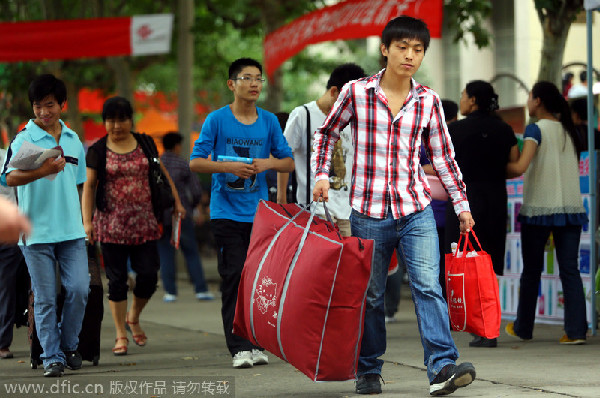 |
|
Freshmen carry their baggage on the first day of their college life at Huaibei Normal University in Huaibei, Anhui province, Sept 12, 2012. [Photo/IC] |
According to the Jiangsu province education department, tuition fees for some majors, including medicine, engineering and liberal arts, will increase by up to 17.2 percent, from about 4,600 yuan ($747) to 5,500 yuan a year.
The Ningxia Hui autonomous region announced that tuition fees for many majors, such as science, engineering and agriculture, will increase by more than 50 percent, and some others will almost double.
Most universities in Guizhou, Zhejiang and Shandong provinces have also raised fees.
Though students pursuing bachelor's degrees in Guangdong province will not need to pay thousands more, graduate students will be forced to pay much higher tuition fees.
Ning Mei, a graduate student recently admitted to a Guangdong university, said she has to pay more than 80,000 yuan in three years to finish higher education, which just one year ago would have been free.
"Many students, especially those from poor families, will be under great financial pressure to gain places in universities," said Ning. "Though some people in China are rich, we have to realize that many families from rural areas earn less than 10,000 yuan a year."
Wang Lupei, director of the financial bureau of Jiangsu's education department, said that tuition fees have not been adjusted for 14 years in Jiangsu.
"Those funds need to cover teachers' salaries, establish laboratories and purchase equipment. To make up the shortfall, the universities have repeatedly asked to raise tuition."
Ni Qiandao, deputy director of Jiangsu's education department, said that more scholarships will be awarded to college and graduate students in the new semester.
"Every postgraduate student will be given 6,000 yuan a year, and a doctorate candidate can get 12,000 yuan," said Ni. "Students who do well in the university will receive up to 30,000 yuan a year."
"Bachelor's-degree students can apply for student loans of 8,000 yuan a year, and graduate students can get 12,000 yuan. In addition, 4 million yuan will be given to students from poor families.
He added that students with disabilities will go to universities for free.
Xiong Bingqi, deputy director of 21st Century Research Institute, said that Chinese universities, many of which are heavily in debt due to campus expansion, need to have a supervision system after they are better-funded.
"They should improve the financial mechanism, and avoid unnecessarily demolishing and reconstructing buildings," Xiong said.
